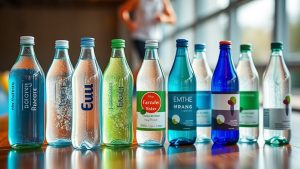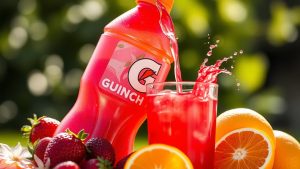
Gatorade's nutrition label reveals key information about its high sugar content, which provides quick energy, and its electrolyte composition, essential for hydration during intense workouts. With about 22 grams of added sugars and sodium and potassium to replenish what's lost through sweat, it's designed for athletes. However, the high sugar levels raise health concerns for non-active individuals. If you're curious about how to balance Gatorade with your nutritional needs, you'll find more insights ahead.
When it comes to hydration during intense physical activities, Gatorade stands out as a popular choice among athletes. Its nutrition label reveals essential insights about what you're consuming when you reach for this sports drink. Understanding these details can help you make informed decisions about your hydration strategy, particularly if you're engaged in high-intensity workouts.
The primary ingredients in Gatorade include water, sugar, dextrose, citric acid, and salt. Each of these components plays a role in hydration and energy replenishment. The presence of sugar and dextrose provides a quick source of carbohydrates, which are vital during prolonged exercise. However, it's significant to mention that a 12 fl oz serving contains about 22 grams of carbohydrates, all of which are added sugars. This means that if you're monitoring your sugar intake for health reasons, the drink's high sugar content could be a concern.
Gatorade's key ingredients, including sugar and dextrose, offer quick energy but come with a high added sugar content.
Gatorade's sodium and potassium levels are notable as well. With around 160 mg of sodium and approximately 50 mg of potassium per serving, these electrolytes are key for maintaining fluid balance in your body during intense physical activity. The drink serves to replenish the electrolytes lost through sweat, helping you stay hydrated and balanced. This aspect is particularly beneficial compared to plain water, which lacks these essential minerals. Gatorade's formula has been scientifically researched and game-tested, making it a reliable option for hydration.
While the drink is effective for hydration, it's valuable to highlight that it contains artificial ingredients, such as Yellow 5 and Blue 1, which are used to enhance its visual appeal. These additives may raise concerns for some consumers, especially those who prefer natural products. The inclusion of low-calorie sweeteners, like acesulfame potassium and sucralose in some formulations, also adds a layer of complexity regarding overall health implications.
Gatorade is scientifically tested and has been a staple among athletes for years, helping to provide the energy needed for peak performance. However, its high added sugar content has been linked to potential health risks, such as obesity and related cancers. If you're using Gatorade primarily for hydration during workouts, it's vital to balance it with other nutritional needs throughout your day.
In terms of processing, Gatorade falls into the moderately processed category due to the presence of artificial ingredients and potentially genetically engineered components. If you're seeking organic or less processed options, you might want to explore alternatives.
Ultimately, Gatorade's nutrition label tells you a lot about its intended use. It's designed mainly for athletes and individuals engaging in high-intensity activities, making it suitable for post-workout hydration. But if you're not participating in such activities, the high sugar content and artificial ingredients may not align with your nutritional goals. Understanding these aspects can guide your choices in hydration and overall health management.
Conclusion
Understanding Gatorade's nutrition label can help you make informed choices about hydration and energy replenishment. While some believe it solely fuels athletes, it's crucial to recognize it also contains sugars and electrolytes that might not be suitable for everyone. If you're active, Gatorade can be beneficial, but for casual users, water may suffice. By analyzing the label, you can discern if Gatorade aligns with your personal health goals and activity levels, ensuring you stay properly hydrated.



